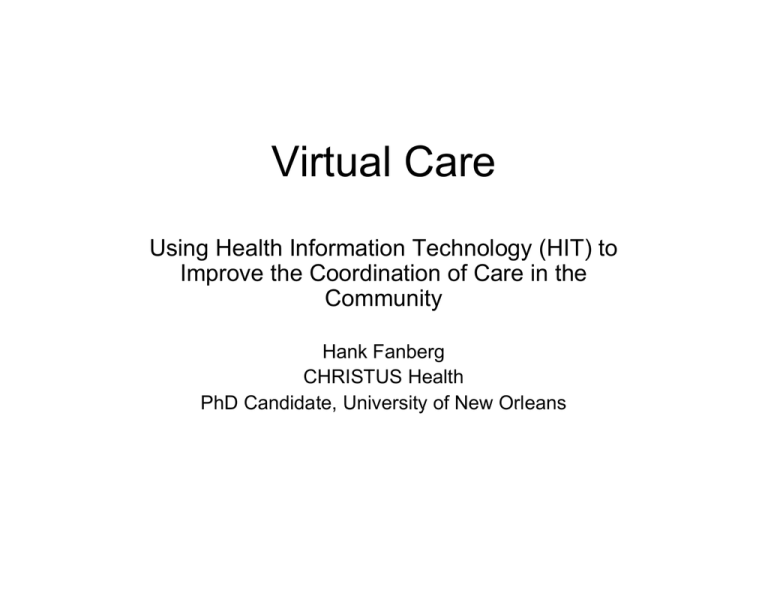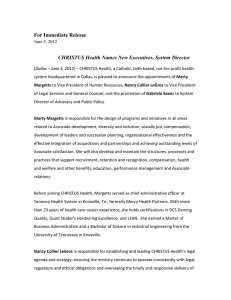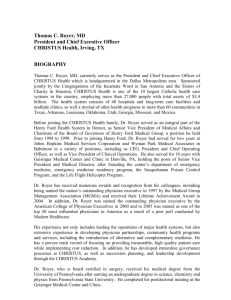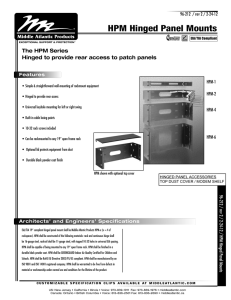Virtual Care Using Health Information Technology (HIT) to g gy (
advertisement

Virtual Care Using g Health Information Technology gy ((HIT)) to Improve the Coordination of Care in the Community Hank Fanberg CHRISTUS Health PhD Candidate, University of New Orleans Care Management - Vision To expand access to care for the underinsured through the establishment t bli h t off well ll coordinated, di t d sustainable community-based collaborations in each CHRISTUS Region; these community collaborations should provide accessible primary health care and a p array y of affordable health complete and social services. Care Management - Goals CHRISTUS Health will pursue its vision through the development of a community based delivery f framework k that th t iincorporates t the th following f ll i complementary goals: 1. Development of essential health and social service resources (“building bl k ”) for blocks”) f the th under-insured d i d 2. Proactive management of the underinsured who frequently access ED/inpatient services for healthcare CHRISTUS Health $250 Million charity Care in 2008 Relationship Between Household Health Status and Income Income and Fair or Poor Health Status Source: Centers for Disease Control and Prevention, National Center for Health Statistics. National Health Interview Survey 1995. Relationship Between Health Status and Education Ed Education ti and d Income I SOURCE: U.S. Department of Commerce, Bureau of the Census, Current Population Survey, March 1997 Ranking % Uninsured Area (Commonwealth Fund 2005 N = 51) % Below Poverty (US Census 2006 N = 50)) LA 47 49 9 NM 49 48 TX 51 43 Electronic Readmission Prediction Model Developed at PHHS Parkland is finding that readmission rate is 90% more related to Social Severity Index than to Clinical interventions – Predicted readm mission rate .6 .5 .4 .3 .2 .1 1 0 0 .1 .2 .3 .4 .5 O b s e rv e d re ad m is s ion s ra te D eriv atio n (n = 11 1 6) V a lid a tio n (n = 3 76 ) .6 Amarasingham, 2009 Building Blocks for a Healthy Community Expanded Health Insurance Coverage Medical Home (Provider) Behavioral Health Services Uninsured U i d In the Community Specialty Care & Diagnostic Services Enrollment : Government Programs Transportation Wellness & Prevention Dental Services Care Navigation& Management g Medications & Home Medical Equipment Synonyms • Ambulatory Sensitive Conditions – California; Catholic Health West • Avoidable Hospitalizations – Commonwealth Fund • Preventable P t bl Hospitalizations H it li ti – State of Texas DSHS Chronic Illness • Chronic illnesses require specialized and complex t t treatment t protocols t l that th t usually ll involve i l a team t off health h lth care providers from a variety of disciplines. • By using a variety of advanced telecommunication t h i techniques and d capabilities, biliti care can b be d delivered li d th thatt bridges geographic and synchronization distances. • It is the nature of the interactions that are important and not the physical presence of the entire care team at the same place and time. • Adopting a patient centric philosophy improves the collection of monitoring data that supports clinical decision making, not to mention the improved communications. What’ss Changed? What • PATIENT centric • Geographic synchronization v. Time synchronization – Right place, wrong time (to quote Dr. John) – Fact F t versus perception ti • Improved communications • Improved data collection • Improved decision making Disease Management - definition • A set of coordinated healthcare interventions and communications for populations with conditions in which patient self care efforts are significant. • Disease Management Association of America Information and Communication T h l Technology (ICT) • ICT introduces new ways to enhance and supplement communication between patient and provider • and provider to provider • ICT enables shift from institution centric to patient centric systems Virtual Care • This approach pp is sometimes considered to be creating “virtual care teams.” • “Virtual” teams are founded with the purpose of collectively ll i l conducting d i activities i i i related l d to care delivery and education through the use of telecommunications technology • The virtual approach allows the patient to stay home and be involved in the care delivery process. Tools for Virtual Care • • • • • • • Communications Networks EMRs PHRs Interoperability H Home monitoring it i d device i Cell Phone Facebook & Twitter = the EMR of the future Tools for the Virtual Clinic • Smart Grid and Agents Emergency Department Visits* C Care Managed C Clients N = 95 300 250 229 200 150 94 100 50 0 Pre *Actively managed in second quarter (All Sites Combined) Source: HPM Seven sites reporting •Includes annualized data Note: Includes ED visits to CHRISTUS Health facility only Post Inpatient Admissions* Care Managed Clients N = 95 200 150 138 100 51 50 0 Pre *Actively managed in second quarter (All Sites Combined) S Source: HPM Seven sites reporting •Includes annualized data Note: Includes admissions to CHRISTUS Health facility only Post Return on Investment C Care Managed C Clients N = 95 $3 00 $3.00 $ $2.76 $2.50 $2.28 $2.01 $2.00 $1.67 $ $1.50 $1.00 $0.50 *Actively managed in second quarter (All Sites Combined) 3/31/2008 Source: HPM Seven sites reporting * Includes annualized data 6/30/2008 9/30/2008 12/31/2008 * Average Cost of Care C Care Managed C Clients N = 95 $20 000 $20,000 $18 390 * $18,390 $17,513 $15,022 $15,000 $10,000 $7,387 $5 209 $5,209 $5,000 $0 Pre Post *Actively managed in second quarter (All Sites Combined) 6/30/2008 Source: HPM Seven sites reporting * Includes annualized data 9/30/2008 12/31/2008 $4,390*







